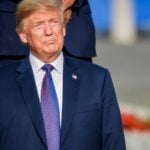In a recent interview on “CBS Mornings,” former President Obama expressed his concerns about the future of the United States, with his biggest worry being the impact of a divided media.
Reflecting on the changes he has witnessed over the years, Obama highlighted the profound shift in the media landscape and its consequences on public discourse.
During the interview, host Nate Burelson asked Obama about his post-presidential concerns for the country.
Obama responded, “The thing that I’m most worried about is the degree to which we’ve now had a divided conversation, partly because we have a divided media.”
Media landscape marked by ‘denial’ and ‘disbelief’
He emphasized the contrast between the past when three major television networks dominated the news landscape, and the present, where media fragmentation has led to the creation of distinct echo chambers.
According to Obama, the splintering of the media has resulted in people occupying different realities.
Unlike the past, when citizens could at least agree on the existence of common issues, the current state of affairs is marked by denial and disbelief.
He pointed out that divergent narratives and the absence of a shared set of facts hinder constructive debates and impede progress.
Related: Biden’s Campaign Co-Chair Acknowledges His Age Is A ‘Legitimate Concern’
Denying external data hinders ‘meaningful talks’
As the conversation progressed, Obama underlined the importance of returning to a joint discussion and restoring the notion of shared facts.
While acknowledging that disagreements on policy solutions are expected, he argued that denying established data inhibits meaningful talks.
Obama used the example of gun violence, stating, “We may disagree on gun violence in terms of what the best prescriptions are, but we can’t deny the data that says the United States has levels of gun violence that are five, ten, fifteen times more than other countries.”

Obama backs up talk with external references
To further support his perspective, Obama referenced external sources and additional data.
According to a report by the World Health Organization, the United States has significantly higher gun violence rates than other developed nations.
This stark contrast raises essential questions about the factors contributing to this issue.
Mental health issues not an excuse for gun violence
Obama also highlighted the fallacy of simplistically attributing gun violence solely to mental health problems.
He argued that other countries also have individuals with mental health issues, yet they do not experience the same levels of gun violence.
This observation suggests additional factors are at play, demanding a comprehensive examination and a nuanced debate.
Read also: These Republican Politicians All Do Not Support Donald Trump! Some of Them May Surprise You!
Obama’s quest to rebuild discourse and revive democracy
The former president’s commitment to addressing these concerns extends beyond his time in office.
Through initiatives like the Obama Foundation, he aims to bridge the gaps in public discourse and foster a return to a standard set of facts.
By encouraging respectful dialogue and emphasizing evidence-based arguments, Obama hopes to revive the foundation of constructive democratic debates.

Future of the United States threatened by fragmented media
As Obama points out, a fragmented media landscape presents significant challenges to the future of the United States.
Rebuilding a shared understanding of reality and finding common ground is essential for progress and effective governance.
By acknowledging the presence of different perspectives while embracing a standard set of facts, Americans can work towards constructive solutions to the nation’s complex problems.
Read also: First it Was Stoves, Now Joe Biden Targets Gas-Powered Vehicles
Barack Obama’s concerns about divided media
In conclusion, Barack Obama’s concerns about the divided media reflect the changing dynamics of information consumption and its impact on public discourse.
Obama emphasizes returning to a joint discussion and agrees on facts, even in policy disagreements.
By doing so, the nation can foster a more informed, inclusive, and collaborative approach to tackling the challenges ahead.
Read also: Biden Administration Proposes New Rules on Transgender Athletes




 Tags:
Tags:










